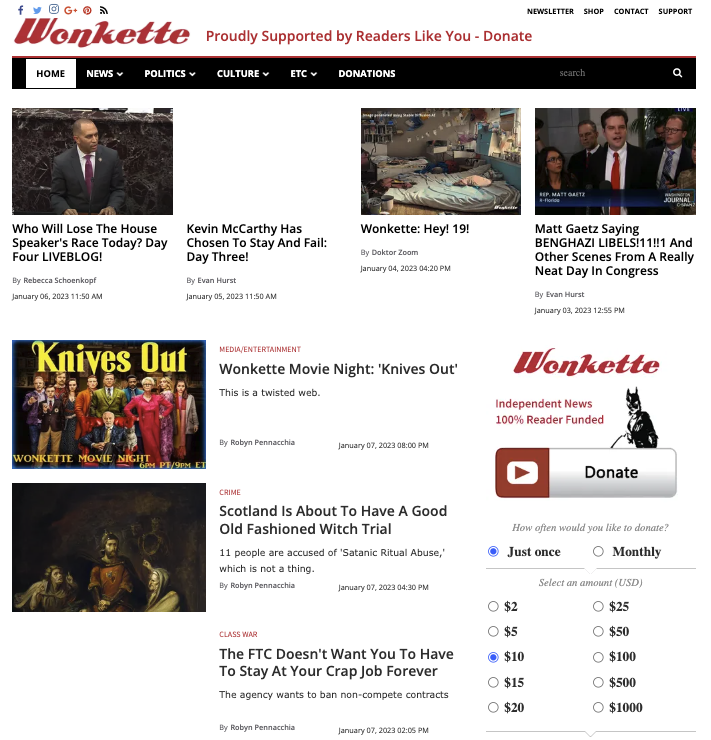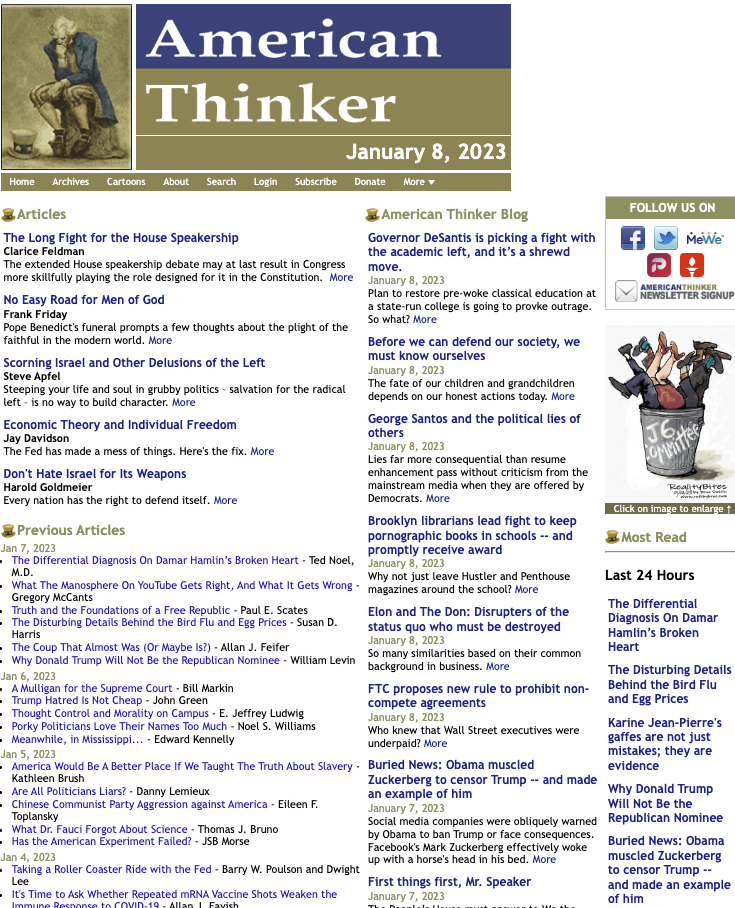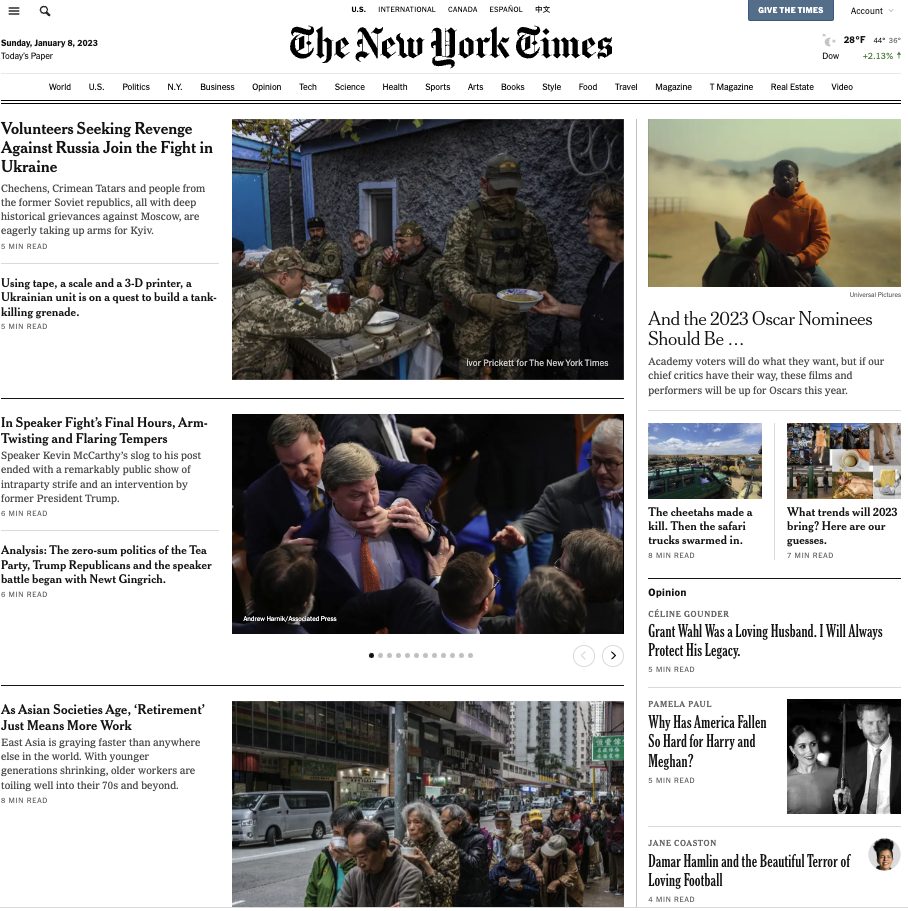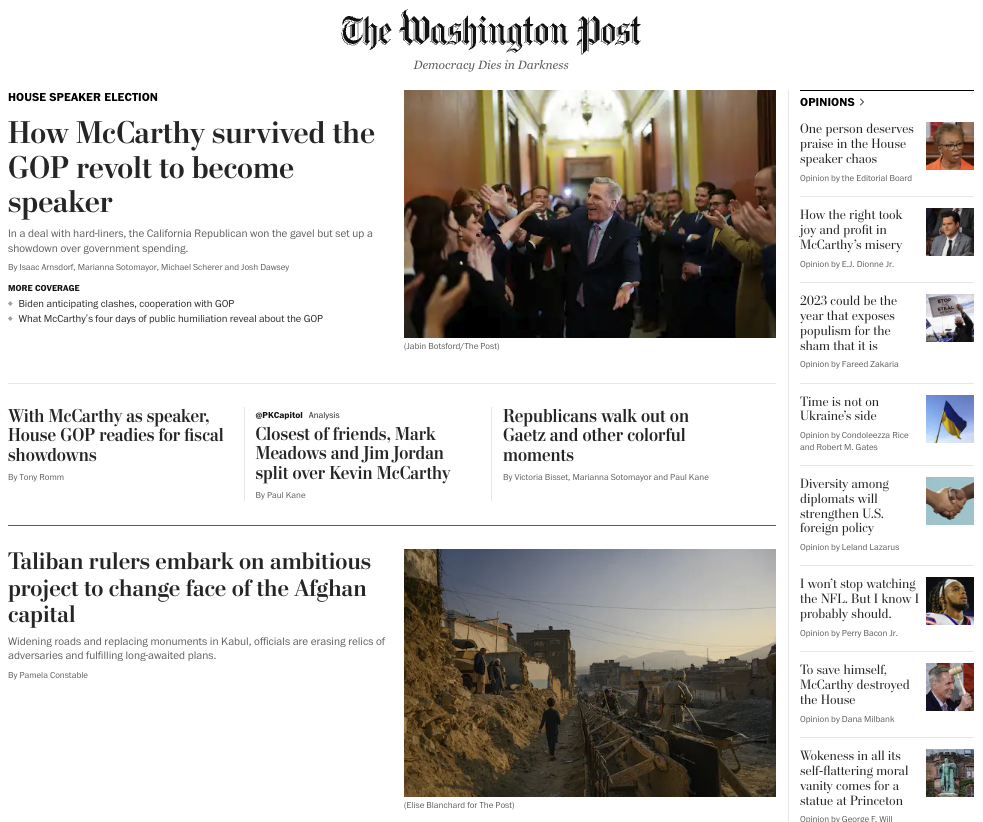Partisan News Easier to Read!
Another reason so many get their information from biased outlets.
Nieman Labs (“Partisan media offers easier-to-read political news than mainstream outlets, study suggests“):
When researchers analyzed almost 6,000 political news stories produced by partisan and nonpartisan media outlets in 2021, three things became clear:
- Media outlets with extreme biases — regardless of whether it was a conservative or liberal bias — tended to use shorter sentences and less formal language than nonpartisan outlets.
- Mainstream news organizations, as a whole, wrote at a higher reading level. For example, stories from Reuters wire service were written at the level of someone who had completed a year and a half of college, on average. Meanwhile, Wonkette, a far-left online publication, wrote at a ninth-grade reading level, on average. American Thinker, a far-right online publication, wrote at an eleventh-grade level.
- Far-right and far-left outlets took a more negative tone than nonpartisan outlets. They generally had a lower ratio of positive to negative words.
I haven’t regularly read Wonkette since its earliest days with Ana Marie Cox (2004-2006) and stopped reading it altogether by the time Alex Pareene left in late 2007. Whether it’s now “hard-left” is a judgment call. But, certainly, it writing style is simple. Here’s a screencap of the home page as of this writing:

Similarly, while I was once a regular reader of The American Thinker from the early days of blogging, mostly because of Rick Moran’s writings there, I haven’t read it more than a handful of times (from a referral link) in the last fifteen years. Its design is a holdover from that era:

Granting that they’re both headline-centric, they’re definitely both written in a punchy language that’s easily accessible.
Contrast that with the home page of the New York Times:

Or the Washington Post:

Neither are exactly William F. Buckley at his worst but they’re definitely aimed at a more educated readership. Partly, though, the difference in style is the need to appear objective.
Sparks, a doctoral student at the University of Florida, and coauthor Jay Hmielowski, an associate professor at UF’s College of Journalism and Communications, analyzed 5,847 news stories published during three one-week periods in early 2021. They only looked at stories that did not appear behind paywalls, however, partly because they wanted to focus on coverage accessible to anyone.
They examined political coverage from a range of news organizations, including broadcast, digital-native and news wire outlets. Of the 20 studied, seven were nonpartisan. Three were far-left outlets, two were far-right and eight outlets produced stories that tended to lean at least somewhat to the right or left.
Sparks and Hmielowski determined outlet bias based on information gathered from three news bias-rating websites: AllSides, Ad Fontes Media and Media Bias/Fact Check. They gauged the negativity of each outlet’s coverage with Readable, a tool that compares the number of negative words — “bashing” and “forbidden,” for example — to positive words — for instance, “accomplished” and “great” — in a written work. Readable assessed stories’ formality based on factors such as sentence structure, the prevalence of impersonal, formal language and whether personal pronouns such as “we” and “I” appeared in the story.
The researchers relied on two widely used readability scales, the Flesch-Kincaid Grade Level and the Gunning Fog Index, to determine the grade level needed to understand news stories produced by each outlet.
Sparks says she was surprised to find similarities between the far-left and far-right media organizations she studied. Both wrote at a lower grade level and used simpler, less formal language.
“Most research has suggested that right-wing media is very distinct from other forms of media and what we found is that’s not necessarily the case with readability,” she adds.
So, why should we care?
The researchers describe their findings in a paper forthcoming in Journalism Studies, “At the Extremes: Assessing Readability, Grade Level, Sentiment, and Tone in US Media Outlets.” While the findings apply only to the 20 media outlets studied, they provide insights into how these news organizations differ and why some audiences seek information from partisan media, which often don’t adhere to professional journalism ethics or norms.
The paper’s lead author, journalist-turned-researcher Jessica F. Sparks, says people generally prefer simpler, easier-to-understand language. “Hyperpartisan” outlets use words a larger share of the population understands. They also present issues and events in simpler terms — often by leaving out key facts and context, especially when it benefits one political party over another, Sparks points out.
“We, as humans, are what we call ‘cognitive misers,’” she explains. “There are people who like to use more cognitive energy, but most of us don’t. And so, when we think about it that way, when we read simplified text — especially text that frames things as us-versus-them — it’s easier to process that than [news reports that examine] the complex goings-on of Washington.”
Which is obvious when you think about it. But, as I constantly have to remind myself, the sort of people who read—much less write for and comment on—political blogs simply spend way more time digging into the nuances of stories than normal people. While I consider heavily-reported sites like the NYT and WaPo essential reading, they’re simply less accessible to those trying to get a sense of what’s going on in the world in a short amount of time.
The researchers offer some advice for the nonpartisan press:
It’s unclear whether partisan outlets intentionally make their content easier to read and understand. But Sparks and Hmielowski indicate their readability helps set them apart from nonpartisan news organizations.
“If audiences are seeking content that reflects their attitudes and that rejects mainstream journalism, partisan media outlets on both sides of the political spectrum benefit from differentiating themselves both in content substance and content style,” the researchers write. “Sentence structure, informality, and tone might be one way to achieve that.”
Sparks, whose journalism has appeared in publications such as The Washington Post and Indianapolis Monthly, says it’s important for journalists working in nonpartisan newsrooms to use simple language. But they also need to provide the public with a nuanced understanding of the issue or event they are reporting on, even if it complicates a news story.
Her advice to reporters: Take time to explain the various sides of an issue. If partisans are oversimplifying an issue, note that in your coverage.
“This study, I think it gives us a better idea of what we’re up against and what journalists at reputable organizations might want to consider when they’re writing news about heavily partisan politics,” she says.
USA Today has been doing this sort of thing for decades but they’re sneered at by consumers of elite outlets. Indeed, I can’t imagine NYT, WaPo, WSJ, and the like following this advice. They’re written by elites (most of their reporters are graduates of elite universities; many have elite graduate or professional degrees) for elites and revel in that fact.
Beyond that, while readability and the “cognitive miser” explanations are surely part of it, people tend to seek out information that’s in harmony with their pre-existing biases. People who read The American Thinker or Wonkette aren’t going there instead of straight news sites are harder to read—again, there are plenty of lower brow choices in that genre—but because they enjoy “news” that tells them what they want to hear and dunks on those who disagree.





That aligns with my intuition. Experience also suggests that people are not “objective” in their search for such nuances. Or in their consideration of them.
We seek info (nuances, if you will) that satisfies our need for narrative closure. In this sense, the cognitive gorger has the same base need as the cognitive miser — they just differ in approach.
Personally (but I’m not a typical reader), I think that the problem with both the NYT and the WaPo is that their reporting is less accessible than, say, USA Today’s without a concomitant greater explanatory value.
NYT and WaPo reporters tend to badly overestimate their expertise compared to those writing for more middle-brow publications. A lot of the “complexity” the NYT and WaPo add to their reporting is just fluff: insider baseball, horse race journalism, or agenda-driven “insights” from “high-level” anonymous sources.
I like analysis, but only from people who at least generally know what they are talking about.
Also, such people generally are not neutral in their reporting, precisely because they are experts in their fields. Which genuine expert on climate science is going to be “objective” (in the “both sides” sense of the word) on this topic? Which person with genuine expertise is going to go along with “good guy with a gun” fantasies?
Perhaps “accessibility” is not the biggest issue with the NYT’s and WaPo’s reporting.
@Mimai:
This take (which is quite facile IMO) completely overlooks that the quality of knowledge can also be judged by the method used to arrive at it.
To give only one example: scientific knowledge is not “scientific” because it is necessarily true, but because it was arrived at through proven and (generally) reliable methods.
In other fields, too, there are qualitative differences between the various manners and methods through which knowledge can be acquired.
@drj:
You write about the quality of knowledge. Which I interpret to mean: how closely does the info approximate Truth. (I’m sure you’ll let me know if I’ve misinterpreted you)
And you note that different methods are more/less good (ie, reliable, effective) at producing such info. The scientific method foremost among the good methods. This is basic epistemology.
I agree with all of this.
I was making a different, perhaps narrower point. Assuming that we (consumers of political news — the topic of the OP) are not generating the info ourselves (ie, we are not running the experiments, doing the ethnography, etc), we must rely on individual and institutional “experts.” And these sources offer different bits of info (content and nuance).
And because we are humans, we are susceptible to confirmation bias and the related need to have a tidy (ie, coherent, closed) narrative. I think this is particularly the case for political (social) issues.
The fact that cognitive misers and gorgers might use different methods to seek (not generate) such info does not mean they have different narrative needs. My point is that they have the same needs. And their methods, though different in kind, are functionally similar.
Of course, we can use meta-methods to discipline ourselves and guard against our natural cognitive-social inclinations. But that’s a different matter.
@Mimai:
That’s not a different matter at all.
To state the bleeding obvious: everyone likes their biases confirmed.
But also: confirmed in relation to an objectively existing reality. In other words, people want their pre-conceived notions to be true. Even Fox News claims to be “fair and balanced,” meaning “We tell you the truth.”
Thus, all people have two needs: 1) to be confirmed in their beliefs; 2) to believe the truth.
But not all people want these two things equally. Some people care more about truth than confirmation. Other people prefer the opposite. The first group in particular also cares about method, because certain methods allow us to arrive at the truth more reliably.
Because of this, statements such as “People are not objective” or “All people have the same base cognitive needs” are useful in the same way as pretending that “All politicans lie” is a profound insight.
It’s not. It’s superficiality masquerading as savviness and worldliness.
@drj:
I think we’re talking past each other — no doubt mostly due to my poor articulation (I write this honestly…..no attempt to be savvy or worldly). As such, I’ll hit the eject button and get on with my Sunday.
A lot of the people I used to work with (since retired) read American Thinker, so I tried to read it to get some feel for where they were at. I found it painful. 11th grade reading level sounds high. But they did no reporting and not even any research. Even more so than, say, FOX, it was like reading Greek because of shared priors and assumptions that were foreign to me, and frankly bizarre.
Definitions of L/R are always suspect and I suspect theirs defines center as average of current sources, updated daily. Complicated by the splintering of the Right. Is the Right still anti-Russian? Pro-corporate? Oligarchic or populist?
But mostly this study seems to fall under the heading of “Breaking news, water is wet.”
And those shared priors and assumptions come on lots of different channels–vocabulary, syntax, rhetorical complexity (for example, the (implied) bias (possibly) that the NYT and others are writing to a “more intelligent” cohort because the language is more complex and the grade level score of the text is higher).